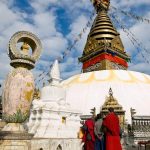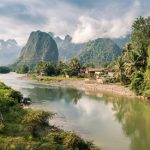 “Full body massage sir? My friend, head and neck massage. Only ten rupees. This is very cheap, very good” said the Indian masseuse. This is the third time I have walked by him with disinterest and I was hoping he’d have got the hint. All day long I have been harassed by boat drivers, ganja dealers, barbers, snake charmers, and rickshaw peddlers. This is the holy city of Varanassi and, to me, the epitome of both the beautiful and bizarre that is India. It is also home to that famous river the Ganges where, according to Hinduism, you can escape the cycle of re-incarnation by having your ashes scattered into the river. Varanassi is a centre of pilgrimage and bald heads and orange robes seem to be all the rage. With all the touts, scams, and filth it can be a trying place for one’s patience. However, it is also a magical place where your imagination can be carried away as quickly as a lassi can turn sour in the heat.
“Full body massage sir? My friend, head and neck massage. Only ten rupees. This is very cheap, very good” said the Indian masseuse. This is the third time I have walked by him with disinterest and I was hoping he’d have got the hint. All day long I have been harassed by boat drivers, ganja dealers, barbers, snake charmers, and rickshaw peddlers. This is the holy city of Varanassi and, to me, the epitome of both the beautiful and bizarre that is India. It is also home to that famous river the Ganges where, according to Hinduism, you can escape the cycle of re-incarnation by having your ashes scattered into the river. Varanassi is a centre of pilgrimage and bald heads and orange robes seem to be all the rage. With all the touts, scams, and filth it can be a trying place for one’s patience. However, it is also a magical place where your imagination can be carried away as quickly as a lassi can turn sour in the heat.
Navigating myself through the twisting labyrinth of back alley’s it is not too easy to find the bathing ghats that line the Ganges river. It is easiest to catch a rickshaw straight to the main ghat, but armed with a map I endeavoured to walk there myself. Two hours later I emerged from the puzzle of alleyways where each corner brought a new twist, a dashed hope and the occasional cow intent on blocking my path.
Once finding one of the 27 Ghats along the Ganges the first thing one notices is, what appears to be, incredible old architecture that runs up and down the main strip. Huge minarets and pagodas tower over me and steps lead down to the water. I later learn that they are designed to prevent severe flooding in monsoon time. India is a realm of the fantastical and unlike anything Western eyes have seen. It can take some adjustment. As much as you try to take in everything it is just not possible. There is simply too much and the sights, sounds and smells assault all of your senses without mercy.
It is early morning and I can see yoga practitioners saluting the rising sun. Next to them a group of women do their washing in, what must be, the world’s dirtiest river. Behind me are three sadhus, the ascetic Indian holy men who wander the country without possessions. With dreadlocks that fall to the ground they are sitting in a small circle, smoking from a chillum pipe and talking softly to themselves. People pray and bathe in the water that the cities 27 sewers flow into. A dead cow floats by and no one bats an eyelid. As with all of India the cycle of life continues.
Suddenly a group of musicians appear from nowhere and an entourage follows. They are carrying a corpse wrapped in a white cloth. Before I know it he is placed on a blazing bonfire. A little boy grabs me by the wrist and instructs me that it is rude to watch a funeral from where I am standing. He leads me up a steep staircase to a platform inside a building. I am surrounded by mostly elderly people that are scattered along the dirty floor in various states of dishevelment. The boy makes sure that I am watching as the Brahmin pokes a metal rod through the skull of the body. The corpse’s family and friends continue to sing. This is a funeral of rejoice and not one of sadness.
Before I leave, the boy explains that the building is a home for the dying. The aged and ill about me have come here to die and are begging for enough money to purchase the expensive wood that will complete their endless cycle of death and rebirth. Cremation in the Ganges is a coveted thing and Hindus from around the world come here to burn and to have their ashes scattered in the Ganges. I leave a donation and later find out that the boy and the dying are in a partnership. He pockets forty percent for his services. In India there is always a middle man and it is an understood custom for the services they provide. The practice is often upsetting and frustrating to tourists.
I’m tired, dirty, hot, and sick of being harassed as a rich tourist. I navigate my return to the hotel to rest next to a fan. As usual, it is not working because of a power failure. Instead, I spend the rest of the morning talking about cricket with some local boys. Next to Hinduism and Islam, cricket seems to be the national religion.
Once the heat of the day evaporates I go for a walk into the cooler night. I meet a Canadian named Brett and we hire a boat to row and watch the sun set over the old city. As we paddle out into the darkness another boat makes its way over to us. Aboard is a Brahmin priest who is selling lotuses with candles inside. They are offerings to the Gods and we buy one for our rower as a blessing. We light the beautiful flower and I watch it float away in what I know to be one of the world’s most polluted rivers.
Varanassi is both beautiful and horrific. The buildings that line the river are decadent, but the water itself holds the remains of decay. Like everything else in this country it is an organic, pulsating and precious place and the wheels of karma continue to turn, just as the wheels of the bus do when I leave in the morning.





Leave a Reply